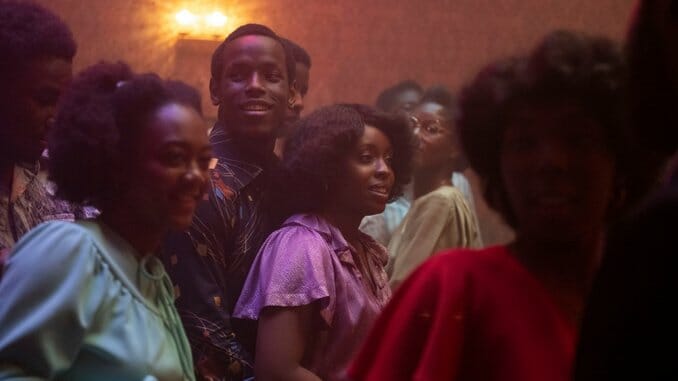Small Axe: Lovers Rock Is an Exhilarating Triumph and a Party like No Other

Following his 2018 prestige pulp thriller Widows, video artist and filmmaker Steve McQueen is presenting audiences with a project of considerably greater ambition: Small Axe, a miniseries (or perhaps anthology?) running on Amazon Prime Video. Not television, Small Axe is a quintet of like-minded movies ranging from lean to large—and its latest chapter, Lovers Rock, dropped on the streaming service last Sunday. A glance at its running time and subject matter suggest a work far removed from McQueen’s usual suffering-forward milieu: The film takes place during a single night, set at a house party in 1980s London. Sounds like fun on a bun!
It is. It isn’t. In her insightful Vulture review, critic Hunter Harris describes Lovers Rock as a snapshot of “what happens when white people aren’t looking.” The film primarily concerns itself with Black joy in secured spaces where Blackness is permitted to thrive sans interrogation and restriction by the whiteness lurking at its edges. McQueen has made a textured, warm, breathtaking and heartbreaking portrait of Black experience, condensed economically into slightly over an hour of runtime. It’s exhilarating. It’s gorgeous. It’s moving. It’s also dangerous. Whiteness doesn’t factor directly into McQueen’s plot through physical violence, but that and more structural violence towards Black livelihood is routinely implied: The party’s very existence is a reminder of its isolated necessity, and even the sight of a police car represents a threat to the event and its participants.
Lovers Rock begins as a company of young Black men and women make their respective preparations for the evening’s house party. Black people living in 1980s London were denied access to the city’s clubs, so they had to throw their own soirees where a couple pounds meant you could eat, drink, make merry, maybe make love, and jam all night without threat of violence from white outsiders. Ensuring that this party in particular makes good on the last promise is Jabba (Marcus Fraser), a downright Herculean doorman whom the door only just accommodates. No one gets in without his say so. Fortunately, most of the partygoers cover their admission and enjoy their good time.